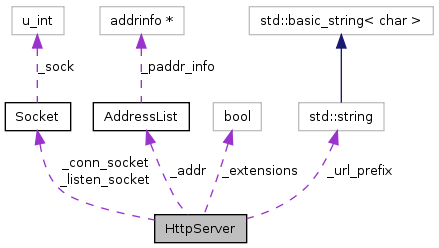#include <httpsrv.h>

Public Member Functions | |
| HttpServer () | |
| ~HttpServer () | |
| void | enable_extensions (bool flag=true) |
| void | register_url (const char *prefix) |
| void | unregister_url (const char *prefix) |
| void | receive_request (HttpRequest &request) |
| void | send_response (HttpRequest &request, const string &str, const char *content_type) |
| void | send_error (HttpRequest &request, u_short code, const char *status_text) |
| void | send (u_short code, const char *status_text, const string &data, const char *content_type, bool connection_close) |
Protected Attributes | |
| AddressList | _addr |
| Socket | _listen_socket |
| string | _url_prefix |
| Socket | _conn_socket |
| bool | _extensions |
Private Member Functions | |
| bool | handle_request (HttpRequest &request) |
Detailed Description
Definition at line 64 of file httpsrv.h.
Constructor & Destructor Documentation
| HttpServer::HttpServer | ( | ) |
Definition at line 209 of file httpsrv.cpp.
: _extensions(false) { }
| HttpServer::~HttpServer | ( | ) |
Definition at line 214 of file httpsrv.cpp.
{
}
Member Function Documentation
| void HttpServer::enable_extensions | ( | bool | flag = true ) |
[inline] |
| bool HttpServer::handle_request | ( | HttpRequest & | request ) | [private] |
Definition at line 265 of file httpsrv.cpp.
References HttpRequest::_command, _conn_socket, HttpRequest::_data, _stricmp, _strnicmp, BUFFER_LEN, Socket::close(), HTTP_GET, HTTP_POST, HTTP_UNKNOWN, SocketReader::read(), SocketReader::read_line(), and sscanf_s.
Referenced by receive_request().
{
SocketReader reader(_conn_socket);
// read the first request line
char line[BUFFER_LEN];
if (reader.read_line(line, BUFFER_LEN) <= 0) {
// The client connection has been closed.
_conn_socket.close();
return false;
}
char command[32];
char path[BUFFER_LEN];
char version[12];
#ifdef __STDC_WANT_SECURE_LIB__
if (sscanf_s(line, "%s %s %s", command, _countof(command), path, _countof(path), version, _countof(version)) != 3)
#else
if (sscanf(line, "%s %s %s", command, path, version) != 3)
#endif
throw Exception("invalid HTML server response");
if (!_stricmp(command, "GET"))
request._command = HTTP_GET;
else if (!_stricmp(command, "POST"))
request._command = HTTP_POST;
else
request._command = HTTP_UNKNOWN;
// read the request header
int content_length = 0;
string content_type;
// string host;
for(;;) {
if (reader.read_line(line, BUFFER_LEN) <= 0)
break;
if (!_strnicmp(line, "Content-length:", 15))
content_length = atoi(line+15);
else if (!_strnicmp(line, "Content-type:", 13))
content_type = line+14;
// else if (!_strnicmp(line, "Host:", 5))
// host = line+6;
}
if (!content_type.empty() && _strnicmp(content_type.c_str(),"text/xml",8) &&
_strnicmp(content_type.c_str(),"application/x-www-form-urlencoded",33)) {
char b[BUFFER_LEN];
sprintf(b, "illegal content type: %s", content_type.c_str());
throw Exception(b);
}
if (content_length) {
request._data.resize(content_length);
reader.read(&request._data.at(0), content_length);
}
return true;
}


| void HttpServer::receive_request | ( | HttpRequest & | request ) |
Definition at line 247 of file httpsrv.cpp.
References _conn_socket, _listen_socket, handle_request(), Socket::init(), and INVALID_SOCKET.
Referenced by server_test().
{
do {
if (_conn_socket == INVALID_SOCKET) {
if (listen(_listen_socket, 4) < 0)
throw LWSE();
SOCKADDR_IN sin;
socklen_t sin_len = sizeof(sin);
SOCKET accept_socket = accept(_listen_socket, (struct sockaddr*)&sin, &sin_len);
if (accept_socket != INVALID_SOCKET)
_conn_socket.init(accept_socket);
}
} while(!handle_request(request));
}


| void HttpServer::register_url | ( | const char * | prefix ) |
Definition at line 219 of file httpsrv.cpp.
References _addr, URL::_hostname, _listen_socket, URL::_path, URL::_port, _url_prefix, Socket::bind(), and AddressList::resolve().
Referenced by server_test().
{
URL parsed_url(prefix);
if (!parsed_url._hostname.empty() && parsed_url._hostname!="+")
// initialize address with hostname and port
_addr.resolve(parsed_url._hostname.c_str(), parsed_url._port.c_str(), 0);
else
// initialize address only with port assignment
_addr.resolve(NULL, parsed_url._port.c_str(), AI_PASSIVE);
_url_prefix = parsed_url._path;
_listen_socket.bind(_addr);
}


| void HttpServer::send | ( | u_short | code, |
| const char * | status_text, | ||
| const string & | data, | ||
| const char * | content_type, | ||
| bool | connection_close | ||
| ) |
Definition at line 345 of file httpsrv.cpp.
References _conn_socket, Socket::close(), and Socket::send().
Referenced by send_error(), and send_response().
{
// send the HTML response header
ostringstream buffer;
buffer << "HTTP/1.1 200 OK\r\n";
buffer << "Server: XMLStorage XMLRPC\r\n";
buffer << "Content-length: " << data.length() << "\r\n";
buffer << "Content-type: " << content_type << "\r\n";
// buffer << "Date: ...\r\n";
if (connection_close)
buffer << "Connection: close\r\n";
buffer << "\r\n";
const string& header = buffer.str();
_conn_socket.send(header.c_str(), header.length());
// send the response body
_conn_socket.send(data.c_str(), data.length());
if (connection_close)
_conn_socket.close();
}


| void HttpServer::send_error | ( | HttpRequest & | request, |
| u_short | code, | ||
| const char * | status_text | ||
| ) |
Definition at line 335 of file httpsrv.cpp.
References BUFFER_LEN, and send().
Referenced by server_test().
{
char buffer[BUFFER_LEN];
sprintf(buffer, "%d - %s", code, status_text);
string error_msg = buffer;
send(code, status_text, error_msg, "text/plain", true);
}


| void HttpServer::send_response | ( | HttpRequest & | request, |
| const string & | str, | ||
| const char * | content_type | ||
| ) |
Definition at line 330 of file httpsrv.cpp.
References _extensions, and send().
Referenced by server_test().
{
send(200, "OK", str, content_type, !_extensions);
}


| void HttpServer::unregister_url | ( | const char * | prefix ) |
Definition at line 235 of file httpsrv.cpp.
References _addr, _listen_socket, URL::_path, _url_prefix, AddressList::clear(), and Socket::close().
{
URL parsed_url(prefix);
if (parsed_url._path == _url_prefix) {
_listen_socket.close();
_addr.clear();
_url_prefix.erase();
}
}

Member Data Documentation
AddressList HttpServer::_addr [protected] |
Definition at line 92 of file httpsrv.h.
Referenced by register_url(), and unregister_url().
Socket HttpServer::_conn_socket [protected] |
Definition at line 97 of file httpsrv.h.
Referenced by handle_request(), receive_request(), and send().
bool HttpServer::_extensions [protected] |
Definition at line 100 of file httpsrv.h.
Referenced by enable_extensions(), and send_response().
Socket HttpServer::_listen_socket [protected] |
Definition at line 93 of file httpsrv.h.
Referenced by receive_request(), register_url(), and unregister_url().
string HttpServer::_url_prefix [protected] |
Definition at line 94 of file httpsrv.h.
Referenced by register_url(), and unregister_url().
The documentation for this struct was generated from the following files:
 1.7.2
1.7.2